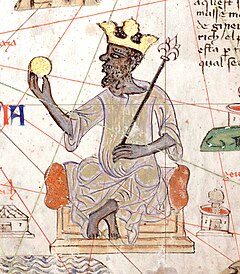
Mansa (N'Ko: ߡߊ߲߬ߛߊ; pl. marnsa) is a Maninka and Mandinka word for a hereditary ruler, commonly translated as "king". It is particularly known as the title of the rulers of the Mali Empire, such as Mansa Musa, and in this context is sometimes translated as "emperor". It is also a title held by traditional village rulers, and in this context is translated as "chief".
Mansa contrasts with another Manding word for ruler, faama. Faama emphasizes the military, coercive authority of a ruler, and can be translated as "tyrant", whereas mansa refers to a hereditary ruler whose authority is derived from tradition and mystical power. A ruler can be both a faama and a mansa, but a mansa was not necessarily a faama.
The word mansa (Arabic: منسا, romanized: mansā) was recorded in Arabic during the 14th century by North African writers such as Ibn Battuta and Ibn Khaldun, who explained it as meaning "sultan". Cognates of mansa exist in other Mandé languages, such as Soninke manga, Susu menge, and Bambara masa. Vydrin also compared it to mensey, the Guanche word for their rulers. According to Misiugin and Vydrin, the original meaning of the root word was probably "chief of hunters" or "chief of warriors".
An alternate translation of mansa, which Jansen attributes to the followers of Marcel Griaule, is that mansa means "god", "the divine principle", or "priest-king". Jansen notes that they have not provided their reasoning for choosing this translation.
List of Mansas
Main article: List of MansasReferences
- ^ Vydrin 2015, p. 260.
- ^ Misiugin & Vydrin 1993, p. 105.
- Schaffer 2005, p. 333.
- Jansen 1996, p. 99.
- Macbrair 1839, p. 40.
- ^ Jansen 1998, p. 256.
- Conrad & Condé 2004, pp. xv, 198–199.
- Sutton 1997, p. 221.
- ^ Chappatte 2022, p. 22.
- Vydrin 2015, p. 218.
- Levtzion & Hopkins 2000, pp. 289, 333.
Works cited
- Chappatte, André (2022-11-01). In Search of Tunga: Prosperity, Almighty God, and Lives in Motion in a Malian Provincial Town. University of Michigan Press. ISBN 978-0-472-22074-8.
- Conrad, David C.; Condé, Djanka Tassey (2004). Sunjata: a West African epic of the Mande peoples. Indianapolis: Hackett. ISBN 0-87220-697-1.
- Jansen, Jan (1996). "The representation of status in Mande: did the Mali Empire still exist in the Nineteenth Century?". History in Africa. 23: 87–109. doi:10.2307/3171935. hdl:1887/2775. ISSN 0361-5413. JSTOR 3171935. S2CID 53133772.
- Jansen, Jan (1998). "Hot Issues: The 1997 Kamabolon Ceremony in Kangaba (Mali)". The International Journal of African Historical Studies. 31 (2): 253–278. doi:10.2307/221083. hdl:1887/2774. ISSN 0361-7882. JSTOR 221083.
- Levtzion, Nehemia; Hopkins, John F. P., eds. (2000) . Corpus of Early Arabic Sources for West Africa. New York, NY: Marcus Weiner Press. ISBN 1-55876-241-8.
- Macbrair, R. Maxwell (1839). A grammar of the Mandingo language: with vocabularies. London.
- Misiugin, Viacheslav M.; Vydrin, Valentin F. (1993). "Some archaic elements in the Manden epic tradition: the "Sunjata Epic" case". St. Petersburg Journal of African Studies. 2: 98–111. ISSN 1025-4544.
- Schaffer, Matt (2005). "Bound to Africa: the Mandinka Legacy in the New World". History in Africa. 32: 321–369. doi:10.1353/hia.2005.0021. eISSN 1558-2744. ISSN 0361-5413. S2CID 52045769. Retrieved 2022-04-13.
- Sutton, J. E. G. (1997). "The African Lords of the Intercontinental Gold Trade Before the Black Death: al-Hasan bin Sulaiman of Kilwa and Mansa Musa of Mali". The Antiquaries Journal. 77: 221–242. doi:10.1017/S000358150007520X. eISSN 1758-5309. ISSN 0003-5815. S2CID 129875132.
- Vydrin, V. F. (2015). Manding-English Dictionary: (Maninka, Bamana). Volume 1, A, B, D-DAD. Lac-Beauport: MeaBooks Inc. ISBN 978-0-9939969-3-1.
| Mali Empire | ||||||
|---|---|---|---|---|---|---|
| People |
|  | ||||
| Geography |
| |||||
| Society and government | ||||||
| Military | ||||||
| Economy | ||||||
| Culture | ||||||
| Other topics | ||||||
23°25′48″N 72°40′12″E / 23.43000°N 72.67000°E / 23.43000; 72.67000
Categories: